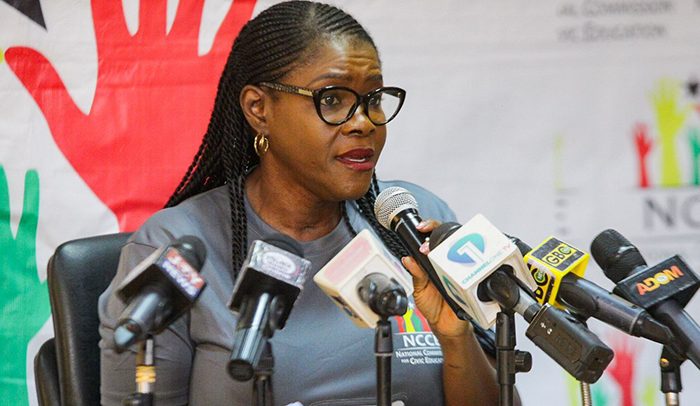Kathleen Addy
THE NATIONAL Commission for Civic Education (NCCE) is rolling out a parliamentary candidates’ dialogue programme as part of its efforts to sensitise the Ghanaian public on a free and fair election this year.
At a press conference in Accra yesterday, the NCCE Chairperson, Madam Kathleen Addy, stated that these dialogues are part of ongoing efforts to foster an informed electorate and promote peace in the upcoming elections.
The NCCE’s Parliamentary Candidate Dialogues (PCDs), she explained, are platforms for interactions at the constituency level, and would provide candidates the opportunity to communicate their visions and policies to the electorates while providing them the opportunity to meet up close with their parliamentary candidates.
According to Madam Addy, a study conducted by the Commission revealed that education, employment, health, roads and infrastructure, economy and agriculture are among some of most pressing needs of Ghanaians; and that these should be the focal points for political campaigns and dialogues.
“These dialogues are significant for many reasons including encouraging civic engagements; enhancing political accountability; fostering peaceful elections; strengthening democratic institutions; and bridging the communication gap.
“It will (also) give the NCCE an opportunity to remind all citizens of the role of parliamentarians, and to demonstrate democracy in action,” she said.
Stressing on the importance of the dialogues, Madam Addy intimated that, “One of the most important impacts of parliamentary dialogues is in the way they demonstrate democracy in action – where communities gather to interact directly with those who offer to represent them.
“They see the contestants sharing platforms, sitting next to each other, being cordial, speaking in turns with no insults, no intemperate language and no threats of violence. These dialogues demonstrate the core principle of ‘contest of ideas’ that underpin true democracy.
“In spite of these efforts by the NCCE, some parliamentary candidates of major political parties are refusing to participate in the dialogues, citing a plethora of excuses, the NCCE Chairperson revealed, describing the phenomenon as “unfortunate.”
She, thus, urged leaders of political parties to allow their members partake in the dialogues as well as other programmes as a way of showing their commitment to Ghana’s democracy.
Other initiatives also lined up by the NCCE include human billboard campaigns; dance for peace campaign; mobile announcements; political parties’ youth activist forums, as well as interfaith dialogues through fun games and peace walks.
By Vera Owusu Sarpong


